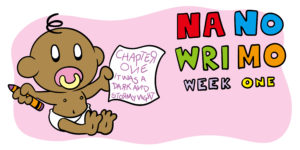Competitions are a touchy subject for most writers. There are a few reasons, but the most prevalent is that it’s just plain scary volunteering to have your work judged. On top of that, the majority of competitions cost money to enter, easily putting off less-experienced writers.
But less-experienced writers are the ones who have most to gain from competitions, so in this article I’ll attempt to demystify the competition process as well as show what you have to gain from writing for competitions.
Before that, however, there’s the big question:
Should you enter a writing competition?
Yes.
Why?
For authors there are three clear lines of professional success. These are not what you need to be happy as an author, but what most authors see as key components in a writing career.
- Is your work complete and available? Thousands upon thousands of writers have a library of ‘nearly ready’ books, but authors produce the finished article.
- Is anyone reading it? This question comes with the proviso ‘out of your target audience’. Of the people you intended to read this book, how many have opened it?
- Did they enjoy it? This third step is questionable, a lot of artists care more about the work’s quality, but word of mouth is key to an author’s professional life.
These three steps are exhilarating to work through, and achieving one doesn’t mean you automatically move onto the next. Many authors are on their sixth or seventh effort before people find their work. The problem, though, is that this definition of success begins with a complete work.
These three steps leave out a huge purgatorial stage where authors are working towards one huge goal and have little success-related sustenance to keep them going. It’s like working towards a job as an executive, but the only role before it is a cleaner. How can you measure your growth or ability when the only confirmation available is getting the top job? Competitions change that dynamic.
Placing in a competition is the equivalent of a promotion or a raise. It’s an acknowledgement that you’re good at what you do, and that if you keep working you’ll reach the position you’re aiming for. Winning even the smallest competition gives so much more structure to authors than they would have otherwise. Making competitions part of your writing sets goals and defines professional success as something other than mass publication and popularity.
In fact, it even helps you on the way to those goals, as you become a more familiar name to people who will buy your work later on.
But that’s just the advantages of success; hardly fit encouragement for authors whose primary fear is that they won’t be successful. Well, good news: whether you win or not, competitions will improve your writing.
Learning discipline
There’s no on-the-job experience for authors. You can take a course, many with fantastic hypothetical training, or shop around for the best advice (we’ll save you some time: it’s here), but the experience of a real audience making a dispassionate, often fiscal, decision about your work is important.
Writing for competitions is different than writing for a course or group because it introduces ‘the crunch’. There’s a deadline after which your work won’t be viewed, no excuses, and no favoritism or friendly tips before it’s ‘done’. Engaging with this type of reader forces you to make decisions, to commit to what you’re writing, and it introduces significant boundaries.
Boundaries are fantastic for authorial growth because they force you into unfamiliar situations. When it comes to your own work you can write whatever you want, but by insisting on boundaries, competitions force you out of your comfort zone and into learning new skills.
Let’s say that you write long fiction and you enter a 3,000 word competition. Writing in your usual style means you run out of words. The first thing to do is to cut unnecessary scenes. Here the competition has already forced an understanding of what each scene does and how it shapes the whole. Next, you have to shorten passages, and update others to make up for the losses. Maybe a character is superfluous, or you need to merge two scenes together.
You can research these skills but only in competition are you really forced to confront how stories work. When you need to remove a scene you realize what the core of that scene is. Sure the mother and daughter bonding scene is too long, but which element of it can you show elsewhere to the same effect? Asking questions like that makes you realize it’s a single line or a particular gesture, and suddenly you understand exactly how and why the scene works.
Shortening a story is just one example. Many competitions have a theme, like travel, or a requirement, like a twist ending. Whether you win these competitions or not, they act as a baptism of fire, forcing you to confront your own style and understand on a mechanical level how your own writing works. Courses and advice can teach you how to write, but only competitions can teach you how you write.
That’s why if you’re just starting out it’s important to hunt down competitions. Win or lose, they will confront you with your own skills and devices in a way that’s uniquely beneficial for developing your writing.
So if you should definitely be competing, how should you go about it?
How to compete
There’s really only one rule to pursuing competitions: set a budget. By this I mean time, as well as money. Financially it’s down to you to decide what you can afford to spend on contest entry and then pursue the contests that fit that model. There are plenty of no-fee competitions out there, and some which offer significant discounts for repeat entries.
Time-wise, you should be entering competitions so you’re only ever engaged in one at a time. More than that doesn’t leave you the time to reflect on your work and may burn you out. Conversely you should always be ‘working’. This can mean either writing an entry or reflecting on what the last effort taught you. Reflecting isn’t a cop-out, and it’s an essential and sometimes difficult task. For this reason it’s best not to go from big competition to big competition with no rest period.
If you take three months to write a competition entry then take at least one to reflect back on it. If you’re working on shorter competitions then try to plan a few ahead, establishing a pattern of work rather than sporadic bursts of effort. The WriteInvite ‘Write on Site’ competition is fantastic for this, as they have a weekly, timed short fiction competition that’s the perfect type of ‘exercise’ for authors.
Once you’ve decided how much you want to spend, and how much of your time you want to dedicate to competitions, it’s time to start identifying the ‘good’ competitions.
What makes a good competition?
Really what makes a good competition is what you stand to get out of it: not financially, but in relation to skill. How far out of your comfort zone does it take you? What will it make you do? If it will stretch you and it’s within your budget then it’s worth a try.
What makes a good writing competition is what you stand to get out of it in relation to skill.Click To TweetBeyond that there are a few indicators that a competition is worth your time:
Level of entrants
- Some competitions are for first-timers, some for amateurs, and some for professionals. To feel like you’re really involved you should select those where you’ll be up against contemporaries. A great competition but one which kills the interest of many first time competitors is the Bridport Prize. This very prestigious competition advertises widely and pulls in a lot of authors, many of them professionals. Because of its fame this is the first stop of many first time entrants who vow to never try again when first place goes to someone with a novel on the bestsellers list. Money isn’t always a perfect indicator but with a first prize of £5000 (approximately $8500) the Bridport Prize is pretty clear who it’s targeting. Check past winners for an idea of who you’ll be entering alongside.
Multiple prizes
- The size of the prize doesn’t matter, but if a competition has a first, second and third it’s usually an indicator that real thought will go into the judging. The judge isn’t just picking their favorite, they’re comparing and contrasting with the knowledge that they’ll have to justify why one entry came out ahead of another. This measure is helpful but not a must. The smaller the competition the less vital it is that more than one winner be chosen.
Multiple judges
- As above. If more than one person is judging it means they’ll have to consider and explain their decisions, and that they’re committed to putting real effort into the decision.
Feedback
- Feedback is often offered for a price. Whether you take it or not, it shows the judge or judges will be thinking deeply enough about the entries to provide feedback. Competition feedback can be useful, but only because it’s from someone who reads a lot of stories. Offering a prize doesn’t automatically make you an expert, so don’t view competition feedback as the definitive word on your work.
Turnaround
- Remember that judges have to read every entry, no matter how bad, before making a final decision. 3,000 word competitions can take months to hear back from. What you need to decide when looking at turnaround time is how long will be useful to you. You need to reflect on work both before and after the competition. If you slaved over a 5,000 word story then it’ll still be relevant to you if the competition announces six months later, you’ll remember what you did and why, but if it was 1,000 word short fiction the result won’t help with your craft.
Final entry
- Your budgeted time is important. Pick competitions you really have time to enter, not those for which you’ll have to rush a first draft. You should also try not to choose something that’s too far in the future to feel real.
Publication
- Many competitions, such as the Winter Anthology Writing Contest, include publication in an anthology. This is a great way to build an audience and make your name recognizable.
Internationality
- In the age of the internet there’s really no reason to limit who can enter a writing competition. Unless it’s for a specific purpose beware those competitions that only allow a select group to enter; they’re just cutting down on how much they have to read.
Good luck
Now you know what you have to gain from competitions and which to enter, you’re good to go. Try and remember that the best approach to writing competitions is to see them as intense training sessions which have value for you whether you win or not. An added bonus is having a stable of ideas, scenarios, characters and short fiction that you can draw from for your non-competition work. And maybe, just maybe, there’ll be some cash in it for you too.
Should You Enter A Writing Competition?Click To TweetHave you had any great, or terrible, competition experiences? Want to brag about your success? If so I’d love to hear from you in the comments.






8 thoughts on “Should You Enter A Writing Competition?”
I think competitions and contests are a great way to get the book into the hands of readers (judges) who care about books. Who knows where the path of your book will end up? I have won eleven book awards and nominations (no money, alas!) and it really helps to put these accolades on your book or author site. Winning or getting even a mention/finalist listing means your book meets the industry’s standards. Rigorous standards are what all author should apply to their books. I have an excellent blog post with loads of information, plus lists of the best and most reputable awards, as well as dates and conditions (eBooks are now accepted in many contests). Drop me a line if interested. Like the lottery: You can’t win if you don’t enter.
Well done, eleven! Whoa.
Indeed, well done.
Hi Fiona,
You’re definitely right about accolades helping authors to progress, and competitions can also be a great way for authors to build familiarity with influential readers.
If you’d like to share that blog post it certainly sounds like it would be useful to our readers.
Best,
Rob
Here it is! There are also links in the article to several industry experts.
http://fionaingramauthor.blogspot.com/2013/01/best-book-awards-for-indie-authors.html
Thanks very much, Fiona.
I have entered contests and won two awards in two years. Whether I place or not, I very much appreciate those contests where the judges critique my work. Whether I agree with the critique or not, I learn from it. Whether or not there is monetary reward for entering a contest, winning rewards me with a blurb to include in my published work.
I have also entered contests that take my money and return nothing, no award, no critique, no anthology as promised. How can we determine if a contest is legitimate?
And I have purchased anthologies of the 25 (or so) winning submissions. I have always disagreed with the rankings. #25 may be better than #1 in my opinion. Does this imply that if the same stories were submitted to several contests, the end results would vary dramatically?
Or is judging stories like judging pornography. In1964, United States Supreme Court Justice Potter Stewart described his test for obscenity in Jacobellis v. Ohio. He wrote: I shall not today attempt further to define the kinds of material I understand to be embraced within that shorthand description [“hard-core pornography”], and perhaps I could never succeed in intelligibly doing so. But I know it when I see it . . .
So each of us know what we think is a good story when we read it? Works for me.
Hi Jim,
Thanks for your thoughts. Feedback is a fantastic side-benefit of entering competitions, and there are quite a few that charge one amount for entry and a little more for a critique. I’d certainly recommend authors take advantage of this option where possible.
As regards spotting illegitimate contests, I’m afraid history is the best indicator. If people are sharing their good experiences, that’s generally an indicator that the competition is legit, and bad experiences are, of course, their own warning. Source and professionalism are also good to consider, as is association with any publications or other institutions. Contests recommended by established magazines and websites have likely been verified, but here you run the risk of missing out on small, local and/or indie competitions which may have fewer entrants and thus more chance of winning. In the end, research is the best bet, but it’s still not certain.
Best,
Rob